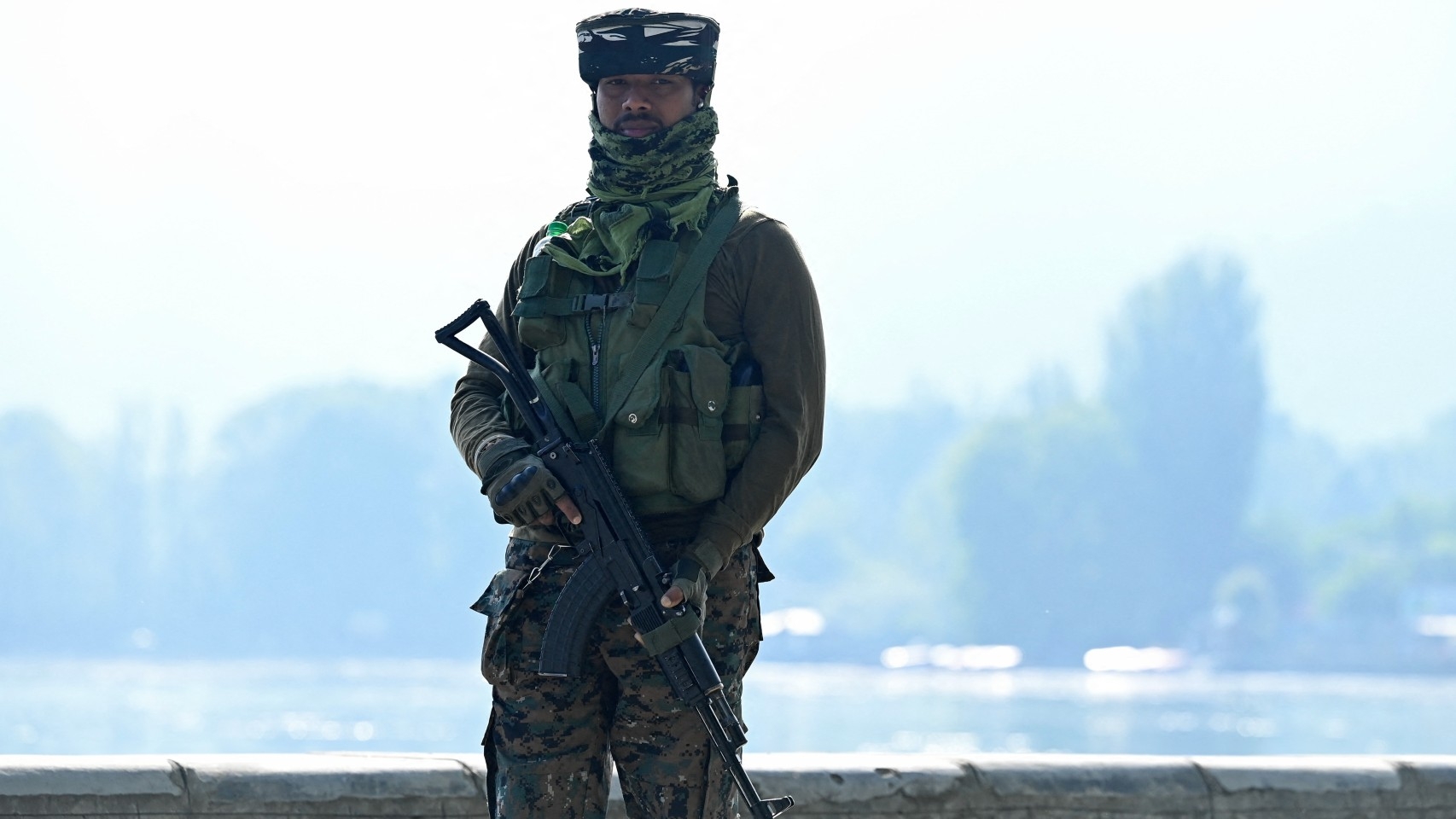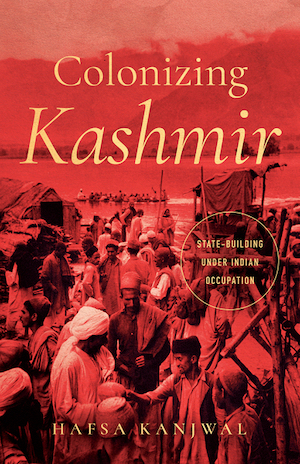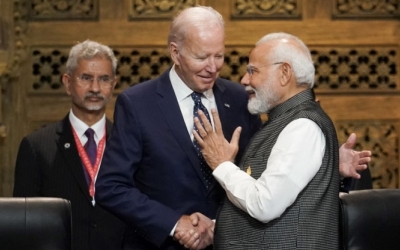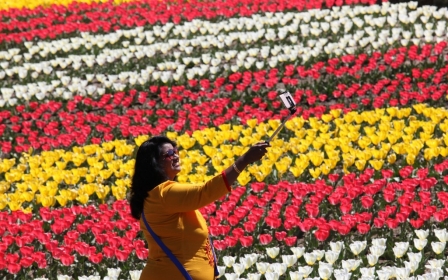Colonising Kashmir: A challenge to India's flawed narrative

The post-World War II period witnessed a pivotal era of decolonisation, as Asian and African nations underwent a transformative journey towards their liberation from western imperialism.
At the same time, as a new global order took shape and Cold War tensions escalated between the United States and the Soviet Union, newly independent postcolonial nations embarked on their own colonisation projects.
The nation-building process in these new sovereign states was not only violent, but also characterised by the adoption of colonial structures and tactics inherited from their former colonial powers - embracing the very cloak of western colonialism they had fought against.
Making Kashmir a case in point, historian Hafsa Kanjwal’s new book, Colonizing Kashmir, delves into the intricate processes of territorial imperialism by India - one of the leading champions of decolonisation and the non-aligned movement in the post-World War II era.
Her book aims to unravel how India’s postcolonial nationalistic discourse entrenched its colonial foothold in Kashmir - a contentious territory sought in full by India and Pakistan as part of their nation-building processes after partition.
New MEE newsletter: Jerusalem Dispatch
Sign up to get the latest insights and analysis on Israel-Palestine, alongside Turkey Unpacked and other MEE newsletters
Kanjwal’s book delves into the intriguing rule of Kashmir’s second prime minister, Bakshi Ghulam Mohammad, one of the lesser-studied personalities of the state’s contemporary political history.
Bakshi’s decade-long rule from 1953-63, which marked the period of Delhi’s full entrenchment in the contentious region, is the focal point of this insightful analysis, which dispels the limitations of previous reductive scholarship on Kashmir and offers a more nuanced understanding of the mechanisms involved in its annexation.
Colonizing Kashmir examines two major paradoxes: India’s emergence as a colonial power in Kashmir during its own process of decolonisation, and Kashmir’s economic development under India’s occupation. Kanjwal contends that one of the key ways Delhi achieved colonial control of the region was through installing client regimes, such as Bakshi’s government.
New power hierarchies
Challenging conventional views, she highlights the new power hierarchies after India’s decolonisation from British rule. Such a frame for re-examining India’s relationship with Kashmir is both critical and refreshing.
Bakshi was a deeply corrupt, shrewd and authoritative political figure who was brought to power through a bloodless coup in 1953, replacing Sheikh Abdullah, Kashmir’s anti-monarch leader and first prime minister. Throughout his duration as the head of Kashmir, Kanjwal notes, Bakshi sought deeper economic and administrative integration with India and “denied the people … their right to self-determination”.
By shifting the focus to what has been known as Kashmir’s “golden period” - characterised by many Indian scholars as a time of development, modernisation, and increased economic and educational opportunities - Kanjwal dissects the governing practices of the Kashmiri state, with a focus on “emotional integration”, a concept similar to the “winning hearts and minds” strategy of colonial powers. This notion was built on colonial tropes of Kashmiris as opportunistic, cunning and weak people, whose political allegiances could be acquired by incentives.
As Kanjwal notes: “Bakshi knew that in order for this relationship [with India] - and his rule - to be legitimised, Kashmiris had to be convinced that this relationship was in their best interest, and they had to develop an emotional bond in favour of India, based on their political and sociocultural identification with the Indian state.”
This examination is thoroughly detailed in the book’s first few chapters, which provide a genealogy of Bakshi’s state-building project, and explore his early life and political beliefs. Kanjwal contends that Bakshi’s policies aimed not only to secure Kashmir’s accession to India and to suppress political dissent, but also to address the economic aspirations of the Muslim population long subjected to unjust policies under previous Hindu Dogra rulers.
After violently putting down protests that followed Sheikh Abdullah’s overthrow and imprisonment, Bakshi instituted economic and educational reforms aimed at empowering Kashmiri Muslims, hoping they would see the practical benefits of acceding to India. He worked to normalise India’s colonial rule among both domestic and international audiences by portraying Kashmiris as content and thriving under Indian rule, while dismissing dissent as foreign-sponsored, primarily by Pakistan.
Conflicting aspirations
Kanjwal’s book focuses on the political challenges Bakshi’s regime faced on three fronts: managing conflicting narratives and aspirations within Kashmir, dealing with the sceptical Indian public and policymakers, and navigating the international community amid shifting political dynamics during the Cold War.
Kanjwal argues that Bakshi’s administration used the media as propaganda, and tightly controlled the flow of information to present a narrative of normalisation and progress in Kashmir. These strategic interventions were made while Kashmir’s status was still being debated in the United Nations. The Bakshi regime’s efforts to target Muslim-majority countries and the Soviet Union played a crucial role in dispelling the “disputed” status of the region, reinforcing India’s claims over Kashmir, and countering calls for an international plebiscite.
The book further delves into the 1950s and ‘60s, when Kashmir attracted film crews and tourists from India, analysing how media and tourism fostered an affectionate fascination with the region. While promoting secular modernisation, the colonial gaze also emphasised Kashmir’s sacredness for Hindu pilgrims.
The subsequent chapters explore how government policies in economic development, education and cultural reform aimed to solidify India’s rule, but resulted in unintended consequences and empowered subjects who eventually unleashed an armed revolt in the late 1980s.
The book unravels how economic policies reflected short-term interests, leading to dependence on India and corruption, and how the state faced challenges from groups seeking political change; it eventually co-opted some of their leaders.
Colonizing Kashmir provides a crucial correction to postcolonial South Asian studies that have omitted, erased or distorted Kashmir’s colonial history.
The premise of a united India, where Kashmir’s forceful absorption is viewed as an inevitable and predestined result, is contested in the book. Instead, it aims to influence academic perceptions of secularism in India by demonstrating how it was used as a tool to solidify colonial rule in India, while excluding Muslim political aspirations and alternative conceptions of nationalism in the region.
Colonizing Kashmir is essential reading for anyone seeking a deeper understanding of the region. Its diligent analysis and exhaustive documentation deftly incorporates the perspectives of Kashmir’s political consciousness and memory. In doing so, the book challenges and disrupts existing historiographical frameworks pertaining to Kashmir and its politics. The work holds considerable resonance with the present and future trajectory of Kashmir.
The timing of its release this month is both ironic and apt, aligning with the Indian Supreme Court’s ongoing hearing of a case challenging the Indian state’s 2019 annexation of Kashmir. This adds significance to the book’s examination of Kashmir’s history and contemporary political landscape.
In the midst of the ongoing contestation over Kashmir's territory, its complex political history also remains a site for competing narratives. In this context, Kanjwal's book emerges as a critical interjection.
The views expressed in this article belong to the author and do not necessarily reflect the editorial policy of Middle East Eye.
Middle East Eye delivers independent and unrivalled coverage and analysis of the Middle East, North Africa and beyond. To learn more about republishing this content and the associated fees, please fill out this form. More about MEE can be found here.







